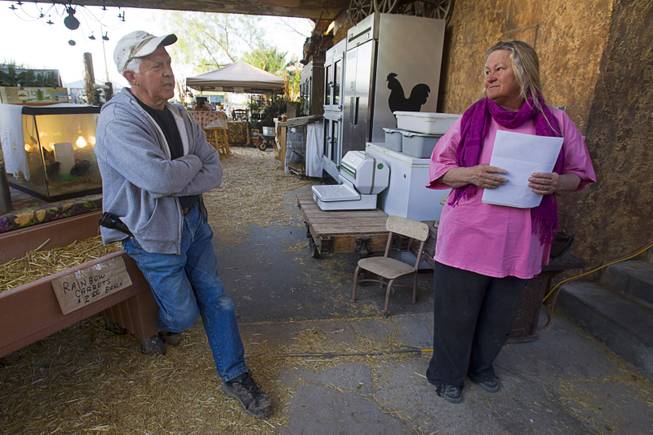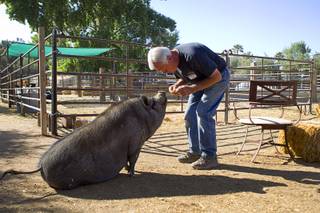
Glenn Linsenbardt talks with his wife, Sharon, about their difficulties in dealing with Clark County regulations at The Farm, 7222 W. Grand Teton Drive, on Wednesday, March 26, 2014.
Sunday, April 6, 2014 | 2 a.m.
Every morning, the roosters crow and the alarm clock beeps in the Linsenbardt household.
It’s 4 a.m., and the sun is still sleeping. Most days, Sharon and Glenn are up before the first sound. The couple of 40-plus years make coffee and trudge out into predawn morning to greet the animals.
On this day, Sharon has a phone call to make, so it’s up to Glenn to feed the 415 animals. The roosters, pigeons, peacocks and cats form a cacophony of crowing, cooing and mewing as he gets to work. Glenn starts with the horses, cows, mules and llama — flipping hay over their pens and talking to each one.
“Good morning. How ya doing?” he says, petting Ellie the heifer. “Aren’t you a sweet girl?”
This has been the couple’s morning routine for the past 46 years on their 5-acre plot called The Farm. The operation — now an animal rescue and farmers market with a petting zoo — was then considered on the outskirts of Las Vegas. But today, suburban sprawl has pushed up against the land at Grand Teton and Tenaya Way, and government regulation is creating uncertainty about the future of The Farm.
Clark County officials want the Linsenbardts to make changes to meet urban codes. Now, the couple face a two-year business license review in May that could leave the farm’s fate hanging in the balance.
“All I want to do is what I’ve been doing for 50 years,” Sharon said.
As Glenn makes his rounds this morning, though, his biggest concern is making sure the animals are well-fed, healthy and content. He returns to the pens with fresh water and a bucket of food. Ms. Violet the pig hears the rattle of the bucket and waddles behind him hoping to gobble up any dropped food bits.
“I’ll be with you in a minute, Violet,” Glenn says, patting her back.
• • •
Inside the gates of The Farm, life is how Sharon remembers it growing up.
Here, the air smells of fresh hay. There are rusted tractors her father and grandfather used to install lamp posts on Fremont Street and old farm equipment on display from her family’s history in Las Vegas. Eggs, honey and vegetables with dirt still on them are for sale, and roosters roam the hay-covered lot with Pearl the white peacock and Oliver the baby goat.
On weekends, families stroll through the petting zoos and farmers market. From time to time a neighbor will drop in and bring nails, or paint or anything else she needs for The Farm, while high school volunteers help with upkeep. No one fights, and no one whines. Sharon wouldn’t allow it anyway.
This is what Sharon wants to preserve. She and Glenn are a month away from their two-year-review in front of the county planning board and are still several weeks away from finishing a parking lot, the final requirement to get a permanent business license.
Sharon has filed for an extension, but she’s nervous. Commissioner Tom Collins’ liaison, Janice Ridondo, said her request isn’t unusual, but nothing in this process has been simple.
“It’s just a big circle nightmare,” Sharon said.
She applied for the proper permits in 2010 to continue operations on The Farm. Her request included permits to host weddings, a cell tower, an event center and a training program — projects to help pay for the growing costs to feed the animals and run The Farm.
Sharon maintained that it was only to legalize the operations she had been doing for decades, but some residents in the rural neighborhood became upset she didn’t talk to them. They feared the couple were out to transform The Farm into a full-blown commercial business encroaching on the area’s rural standards.
“We were fine with the original stuff,” said Wayne Harris, a neighbor. “Nobody wants to close down The Farm; we just wanted to make sure it isn’t the full-blown business that she’s trying to make it be.”
Others, like Timi Ferguson, supported Sharon, recognizing the license as a way to preserve one of the few remaining agricultural enclaves in Las Vegas.
“It provides serenity, peace, a different viewpoint on life,” Ferguson said. “There is more to life than just being around bricks and concrete. ... There are children who have never seen a horse in their life.”
After lengthy zoning and planning meetings, Sharon was approved for everything but the cell tower and event center. But the process left her drained.
“It’s just one thing after another,” Sharon said. “I’m just tired.”
• • •
In the back of The Farm sits a lot filled with mounds of gravel waiting to be shoveled and leveled.
A newly painted sign and gate mark what will become the new entrance for The Farm to prevent people from parking along Grand Teton Drive. Sharon works on it daily, but Glenn’s job as a Farmers Insurance agent means he can only work on it on weekends.
The gravel project is for a 30-spot parking lot, the first phase in one of the last requirements the county has requested of them so they could obtain their permanent business license.
County code initially demanded it be paved and have curbs, but Sharon fought for gravel, to preserve the farm aesthetic.
“I don’t want pavement and sidewalks and gutters here,” she said. “I want a farm.”
Collins, who represents Sharon’s district, and Ridondo have helped Sharon along the way, ensuring that her property doesn’t go the way of concrete. In Collins’ opinion, she has done everything asked of her to earn her permanent business license.
“She’s been doing a good job out there, cleaning things up,” Collins said. “They’ve been jumping through more hoops than they should.”
Ridondo said it is likely Sharon will be granted an extension, but nothing is guaranteed. The county still has to vote at a public hearing in May.
The uncertainty causes Sharon’s voice to quiver. She needs the business license in order to run the farmers market and petting zoo, which supplement her income and allow her to pay for farm costs such as feed, which costs $4,000 a month. She fought this long to preserve the land, but at 65, she just isn’t sure she can keep fighting the county.
If she is denied the license, she’ll donate the animals to other rescue shelters and close her gates for good.
• • •
Glenn stands outside the pens, counting the animals. The sky is still dark on this morning, but with the sun approaching, it has turned different shades of blue.
“Fed, fed, fed,” he says, checking each animal off, making sure no one is forgotten.
After the chickens, he feeds Tank the tortoise and the remaining animals. At 6:30 a.m., Sharon greets Glenn outside as the sun breaks the horizon.
She has a full day planned with a trip to the county building and work on the gravel parking lot. But first, she’ll survey The Farm and make sure no animals were forgotten.


Join the Discussion:
Check this out for a full explanation of our conversion to the LiveFyre commenting system and instructions on how to sign up for an account.
Full comments policy